PhD, Postdoc, and Professor Salaries in Germany
Germany is one of the leading countries for research and a hub for innovation. The country’s high quality of life combined with lower cost of living make it an attractive destination for international researchers. Are you contemplating a move to Germany? Here is a breakdown of the most common German academic jobs and their salaries. All salary statistics in this article are in Euros per month and are pre-tax.
Doctorate Degree
In Germany applicants must apply for a preset doctoral project that is usually tied to a professor’s own research. Students do not do any coursework; they start working on their project immediately. They are also required to take on some teaching responsibilities. The time it takes to earn a doctorate depends on the field, but three to five years is typical.
The salaries of PhD students are based on the federal wage agreement ( Tarifvertrag der Länder or TV-L). There are several pay scales ( Entgeltgruppe ) within the TV-L but PhD students are usually paid at the TV-L E13 level. Within this level, there are three factors that determine the student’s actual salary. The first is the pay grade ( Stufe ) which is based on the number of years of experience you have. Most PhD students start at Stufe 1 and progress through the grades as they gain years of seniority. The next factor is the working hours (50%, 67%, 75%, or 100%) and the final factor which federal state the university is in. You can find the salary calculators for each state here . For example, the salary range for a 100% PhD student is €4,053-€5,701 per month while the range for a 67% PhD student is €2,729-€3,820 per month.
Postdoctoral Researcher/Fellow
After earning their doctorate, researchers go on to a postdoc. A postdoc is a continuation of the researcher’s training that allows them to further specialize in a particular field and learn new skills and techniques. It may require them to take on teaching responsibilities. German postdocs typically last two to four years.
Like all non-tenured academic positions in Germany, postdoc salaries are fairly rigid. They are based on the same TV-L federal wage agreement as PhD salaries. The salaries are determined the same way too, taking into account pay scale, pay grade, working hours, and state. You can find the salary calculators for each state here . Postdocs are paid at the E13 or (less commonly) E14 level , with the exact starting pay grade depending on how their years of experience (bachelor's, Master’s, and PhD) are counted. The salary range for a 100% E13 postdoc is €4,053-€5,701 per month and the salary range for a 100% E14 postdoc is €4,419-€6,076 per month.
Juniorprofessur/Juniordozent
Junior professors positions offer early career academics the opportunity to research, supervision, administration, and teaching experience on equal terms to other university instructors. Junior professorships are usually for three to four years and can be extended for a total of six years. It is often a temporary position, however, certain universities offer a tenure-track option. Germany has recently signed an agreement to create 1,000 tenure-track junior professorships by 2032.
Junior professors, like all German professors, are paid according to the W- Besoldung salary table . This scale dictates base salaries according to which state the university is in. Unlike the PhD and postdoc pay scale, there are no pay grades within this scale. A W1 professor will make minimum €4,713-€5,301 per month.
Professur (W2)
To become a professor, an academic needs to have completed the Habilitation, have a positive evaluation as a junior professor, or have led their own junior research group. W2 professors are considered independent researchers and generally have permanent positions. Internal promotion to these positions is not encouraged in Germany. With the exceptions of junior professors, academics cannot be appointed a professor at the university they did their Habilitation.
The base salary for a W2 professor is €5,365-€6,676 per month depending on which state the university is in. In Bund, Bayern, Hessen, and Sachsen there are multiple pay grades within the W2 band meaning the professor’s salary will increase in five or seven years in the position. Salaries can also be increased by family allowances, retention payments, and performance bonuses. As professors are civil servants with high job security, they do not typically pay the same social insurance contributions as other employees.
Professur (W3)
A W3 professor is the highest German academic position that usually involves responsibility of a chair or for an institute. The requirements to become a full professor are very demanding and as a consequence, there is often a minimum age requirement for this sort of professorship. Professors in Germany are public servants and as such have permanent positions at their universities.
The base salary for a W3 professor is €5,343-€7,578 per month depending on which state the university is in. In Bund, Bayern, Hessen, and Sachsen there are multiple pay grades within the W3 band meaning the professor’s salary will increase in five or seven years in the position. Salaries can also be increased by family allowances, retention payments, and performance bonuses. As professors are civil servants with high job security, they do not typically pay the same social insurance contributions as other employees.

Discover related jobs
Discover similar employers
Accelerate your academic career
8 Tips for Writing a Statement of Purpose
The statement of purpose is an essential part of a PhD application. Use ...
French Academic Job Titles Explained
What's the difference between a professeur des universités and a maître ...
10 Dissertation Writing Tips
The thesis is the capstone of your Master’s or PhD. It’s also an intimid...
More International Researchers Means Better Science
A study in Nature shows the benefit of attracting global research talent...
How to Pay for a PhD
Before applying for a PhD it is important to consider how you will pay f...
Top 10 PhD Interview Questions
While you cannot predict the exact questions you will be asked, certain ...
Jobs by field
- Electrical Engineering 164
- Machine Learning 156
- Programming Languages 145
- Artificial Intelligence 144
- Molecular Biology 127
- Mechanical Engineering 126
- Cell Biology 116
- Electronics 104
- Materials Engineering 103
- Materials Chemistry 97
Jobs by type
- Postdoc 350
- Assistant / Associate Professor 140
- Researcher 124
- Professor 109
- Research assistant 97
- Engineer 75
- Lecturer / Senior Lecturer 65
- Management / Leadership 48
- Tenure Track 41
Jobs by country
- Belgium 296
- Netherlands 154
- Morocco 117
- Switzerland 115
- Luxembourg 60
- United Kingdom 48
Jobs by employer
- Mohammed VI Polytechnic Unive... 117
- KU Leuven 117
- Ghent University 71
- KTH Royal Institute of Techno... 64
- ETH Zürich 62
- University of Luxembourg 59
- University of Twente 47
- Eindhoven University of Techn... 44
- Karolinska Institutet 30
This website uses cookies
- Guide to positions
- Study in Germany
- PhD in Germany
- Postdoc in Germany
- Professor in Germany
- HAW Professorship in Germany
- Thematic guide
- Working in Germany
- Working in Austria
- Working in Switzerland
- Higher education in Germany
- Job profiles
- Service range
- Graduate schools
- Career Advice Overview
Doctorate salaries What does a doctoral candidate earn in Germany?
A doctoral degree will certainly only help you to become rich in an idealistic sense. The first contract for a PhD position should have a term of at least one year - after which, graduates are rewarded with their first salary increase.

What determines the salary of doctoral candidates in Germany?
Which pay band applies to doctoral students in germany, what is the salary of doctorate students in germany, what are levels of experience and how do i gain relevant professional experience during my phd degree in germany, does changing to another research project or institute in germany have an impact on postgraduates' experience level, if doctoral candidates go abroad, become temporarily unemployed or receive a scholarship, what effect does this have on their experience level, what additional salary benefits are there for postgraduates in germany.
Most doctoral candidates are appointed at a university or non-university research institution through a third-party centre or funding centre. These are all civil service institutions, so the salary for employed doctoral candidates is either based on the collective agreement for civil service (TVoeD) or the collective agreement for the civil service in the individual federal states (TV-L). Hesse, which is not a member of the collective agreement community of the federal states, has its own TV-H collective agreement. Other ways to finance your own PhD as a junior scientist include a PhD scholarship, an industrial PhD programme at a research institute in the private sector or an extra-occupational PhD. Even in the case of an industrial PhD programme, postgraduates are usually paid on the basis of a collective agreement. For example, if you are completing your PhD while working for a car manufacturer, the company collective agreement that IG Metall has concluded with the company will apply.
In the case of the TVoeD, TV-L and TV-H, employees are paid according to their professional qualifications and the demands of their job. There are 15 pay bands in this area. Postgraduates are paid in accordance with pay band 13. PhD positions with a classification in pay band 14 are the absolute exception. Advanced postdocs are usually only promoted to a higher pay band if the they take on additional research responsibility. PhD status is no guarantee of promotion to the next pay band.
The collective bargaining agreements between employers and unions are regularly renegotiated. These negotiations aim to improve working conditions and increasing the monthly gross salary of all civil servants. This means that even postgraduates can look forward to a slightly higher salary. As postgraduates rarely fill a full-time position, their actual gross salary needs to be adjusted on the basis of their working hours.
There are newcomers and old hands in every profession. For researchers with a PhD in science, this breadth of experience is taken into account in the experience levels, which each come with a significant salary increase, as is the case for all employees of the civil service. All three collective agreements for civil servants provide for six levels of experience. The time spent at each stage, the stage duration, increases by one year at each stage. According to this scheme, graduates are entry-level applicants. Accordingly, postgraduates start at experience level 1 with the lowest salary. In their first postgraduate position, it is essential that PhD graduates ensure that the contractual term is at least 12 months and that they will be employed for a full year with no interruptions. Employment contracts of less than one year do not qualify as relevant professional experience according to civil service regulations.
When starting in a new position, you are therefore allocated back at Experience level 1 – without taking the progress you have already made into account. This applies even if the change of contract is seamless and remains within the same facility. Experience level 1 must be fully completed in a single employment contract to qualify for Experience level 2. However, once these twelve months have been served, shorter contractual terms then apply as relevant professional experience. Students who are awarded their doctorate within the allocated six years and are employed as a research associate at the same time can therefore also achieve Experience level 4 with a considerable salary when they graduate. It is not important whether you have a full-time position while completing your doctorate or, as is the case for most PhD positions, have a part-time job (50%–75% position).
Employment contracts of less than one year do not qualify as relevant professional experience according to civil service regulations. When starting in a new position, you are therefore allocated back at Experience level 1 – without taking the progress you have already made into account. This applies even if the change of contract is seamless and remains within the same facility. Experience level 1 must be fully completed in a single employment contract to qualify for Experience level 2. However, once these twelve months have been served, shorter contractual terms then apply as relevant professional experience. Students who are awarded their doctorate within the allocated six years and are employed as a research associate at the same time can therefore also achieve Experience level 4 with a considerable salary when they graduate. It is not important whether you have a full-time position while completing your doctorate or, as is the case for most PhD positions, have a part-time job (50%–75% position).
With our Job-Mail, you will receive suitable job ads as well as interesting content matching your search profile on a weekly basis.
Many doctoral candidates are employed in third-party funded projects are required to move from job to job to secure their income. Graduates who have been employed for at least a year with one single employment contract and has therefore gained the required professional experience is in fact in a secure position in terms of their experience level. After this point, shorter contractual terms then apply as relevant professional experience. Even switching between different employers, states and collective agreements is no longer a problem, and the duration of each stage remains the same for doctoral candidates and other researchers from now on. However, they must submit an application to their new employer. In the case of a difficult candidate situation, institutions can even accommodate their future employees to some extent, for example by classifying them into the next experience level earlier than usual. However, in such cases, postgraduate must also have completed their first twelve months without interruption. Employees who change from one collective agreement to another as a postgraduate should inquire in advance whether this will have any detrimental effects on their salary. The collective agreements also stipulate a range of very different salaries within Pay band 13.
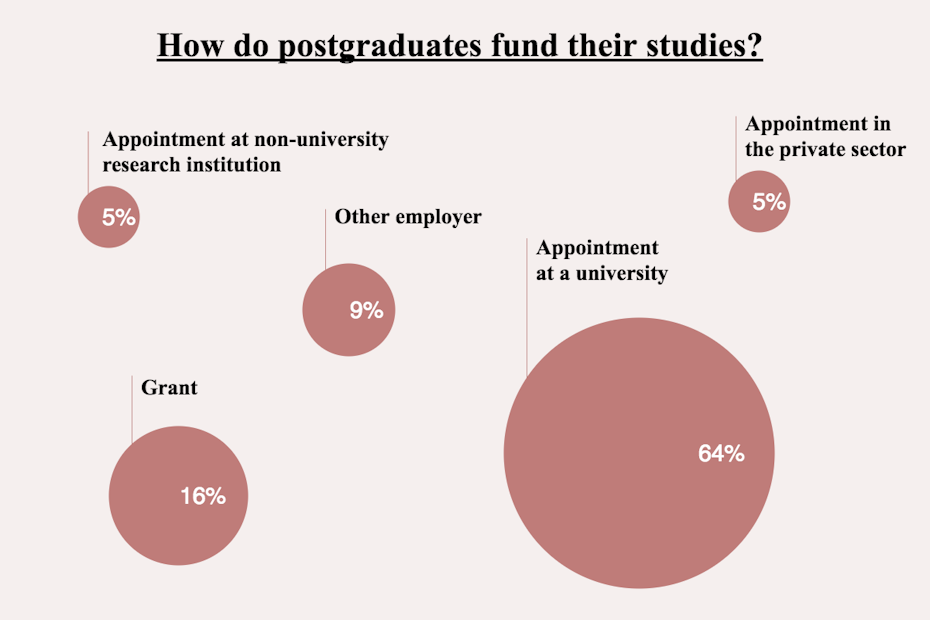
Many doctoral students want to spend a period of time abroad, as this is required in many scientific professions. Others are awarded a scholarship and finance themselves or take a break from their doctorate if they are offered a good job in the private sector. Some things should be kept in mind with regard to the experience level: Employment contracts at foreign universities and research institutions are generally recognised automatically. However, more caution should be taken with scholarships, even if the scholarship is affiliated with an institute and the same work is performed as employed researchers. This time may be included in the duration spent at each stage, but this is not necessarily always the case. After all, this time is considered "beneficial" rather than a "detrimental interruption". The latter is the case, for example, when a doctorate student enters the private sector for several years to continue their doctorate studies there. Only professional experience gained with a public employer is considered relevant. If such an interruption lasts more than three years, the employee may even be punished when returning to public service by downgrading them to a lower experience level. On the other hand, this does not apply to postgraduates on maternity leave or paid leave. This is also true of incapacity for work up to a maximum of 39 weeks. Time spent at the particular stage is still counted in such cases. Parental leave, however, is considered to be an interruption and is not counted for transition to the next experience level.
Postgraduates who hold a PhD position at a research institution receive and annual special payment, like all other employees in the civil service. This varies depending on the collective agreement and tariff area (East or West), but ranges between 33 and 60% of the average gross salary. Postgraduates who already have children and are paid on the basis of the TV-H, which is only valid in Hessen, will also benefit from a child supplement. The collective agreements also allow for additional compensation for services rendered, such as special services associated with the acquisition of third-party funds. However, there is no standard practice among the federal states and the various institutions.
2 PhD candidates (f/m/x) in Imaging or Image Analysis

Doctoral position on ultrafast charge and exciton processes in organic semiconductors (f/m/x)

PhD position (m/f/d) in optoelectronic semiconductors with the possibility to obtain a doctorate degree

Related articles

Doctorates following the traditional model still make up the majority of PhDs in Germany compared to structured programmes. For doctoral candidates from abroad, a traditional PhD requires a great deal of initiative, autonomy and tenacity.

This is a simple guide to how health insurance works in Switzerland and suggests which options may be best for you.

Those who do a doctorate improve their chances on the work market. Are you considering to be a PhD student in Germany? Here's everything you need to know – requirements, options, duration and process.

Physicists working in the private sector can expect a salary significantly higher than average. If physicists remain in teaching and research, diverse opportunities are available, but are associated with a fairly average income.
- home
- wire - news in brief
- search for a job in research and innovation
- ☕ publish a job offer on jobs.myScience
- other job markets
- how to apply for a job
- phd in germany
- postdoc in germany
- professorship in germany
- profile of germany
- working conditions in germany
- daily life in germany
- salary of researchers in germany
- insurances in Germany
- taxes in germany
- search an event related to science and research
- announce an event on events.myScience
- funding of research projects
- scientific information
- administration
- associations
- distance universities
- industrial research
- information
- medical research
- private universities
- private universities of applied sciences
- research associations
- research institutions
- universities
- universities of applied sciences
- universities of education

phd candidate salaries in germany
Calculated on the basis of a full-time position, doctoral students receive between 46,000 and 56,000 euros gross per year, depending on how much experience the doctoral student already has. It should be noted that an employment contract often only covers 50% of the positions.
- The tariff structure for the salary of scientists and scholars in Germany is very transparent. If a doctoral student is a research assistant at a state university or research institution, he/she is automatically a public sector employee and his/her salary is therefore regulated by a collective agreement.
- Depending on the institution, this is either the Collective Agreement for the Public Sector (TVöD) or the Collective Agreement for the Public Sector of the Länder (TV-L). These collective agreements are renegotiated every one or two years.
- All state universities, universities of applied sciences and research institutes thus pay comparable wages. As government-funded research organisations, the Max Planck Society, the Fraunhofer Society and the Helmholtz Association also follow the regulations of the collective agreement for the public sector with regard to employment, pay and social benefits.
- Doctoral students are classified in the lowest salary group E13 for scientists. Since salary group 13 has a very wide range (from newly started doctoral students to experienced postdocs), the salary groups are differentiated according to experience levels. Since 2018, all public sector wage agreements have differentiated between six experience levels, each with increasing duration.
- Doctoral students starting at experience level 1 should therefore make sure that their contract runs for at least 12 months, as employment contracts of less than one year are not considered relevant professional experience. In the event of a new position, you will be re-grouped in experience level 1, regardless of the length of time you have already worked at that level. This is true even if the change of contract is made seamlessly at the same institution. The problem, however, is that employment contracts at universities are often limited to a very short term. Around half of the contracts of academic staff in the doctoral phase are shorter than 12 months.
- The Federal Report on Young Academics and Scientists of the Federal Ministry of Education and Research of 2017 points out that the average monthly net income of doctoral students is 1,261 euros per month. This is at the lowest end of the official standard salaries.
Salaries of doctoral students in Euro per month according to collective agreements, July 2020 the salaries are based on 100% employment
Source: academics.de, public service.info
> Finding a job in research and science
Jobmail & Alerts
Last job offers
Search for job
- » Recruit new employees on jobs.myScience
Master, PhD and Postdoc Scholarships

Salary of PhD and Postdoc in Germany
In Germany, what can you expect to earn as a PhD or Postdoc? Interested in knowing the salary of a PhD or Postdoc in Germany? Did you receive an offer for TV-L E13 (75%)? Are you a Postdoc in TV-L E13 and would like to know deductions? Perhaps, a German University or Research Centre has offered you a PhD or Postdoc contract, but you’re not sure what TV-L E13 (50%), TV-L E13 (75%), or TV-L E13 (100%) mean? In this post, we describe which parameters determine the PhD and Postdoc salary in Germany.
We also make sure to explain so many terms (in German) about this subject. Therefore, this post is helpful for both new or senior PhD students and Postdocs!
Increasing PhD Stipend 2023-2024 in UK
In Germany , similar to other European countries, Universities hire PhD students, and postdocs are on a fixed-term contract. There is no cap on the length of the work contract and can be as short as three months up to three years. In exceptional cases, the employment contract of Postdocs can be five years. German Universities offer TV-L E13 to both PhD students and postdocs. However, the contract level (Stufe) and working hours (Arbeitszeite) are different which we explain in the following section. The typical work contract of PhD students is TV-L E13 (75%) while postdocs are on TV-L E13 (100%). In rare cases, the host institute can offer TV-L E14 to a postdoc.
- Available Fully Funded PhD Positions in Germany
- Available Postdoc Positions in Germany
The PhD and Postdoc salary in Germany is based on “Tarifvertrag für den Öffentlichen Dienst der Länder (TV-L)”. TVL translates to English as “the Collective Agreement for the Public Service of the states”. So as a PhD student Postdoc or even professor, your salary will be defined in various Remuneration (Entgelt (E)) of TVL which will be explained in the next section.
What is Entgelt (remuneration/payment)?
Entgelt (remuneration) is the level of payment set by the employer. It reflects the formal duties of the job and the level of competencies that the employee in that group has. For instance, Entgelt 13 to 15 (TV-L E13-15) is for employees with academic higher education. Entgelt 9 to 12 (TV-L E9-12) is for those employees with a completed technical college education. Entgelt 5 to 8 (TV-L E5-8) is for workers who have vocational training. As an alternative to a funded PhD position, you can also apply for DAAD doctoral scholarship. The following video explains the 10 reasons why you should do your PhD in Germany in 2023.
How much is the net salary of PhD students and postdocs in Germany?
It is not an easy question to answer in a few words. In this post, we try to explain the first meaning of each term of the contract and taxing system in Germany. So at the end of this post, you will be able to find out how much your net salary (take-home money) will be.
Arebitszeit (working hours/ hours of work) of PhD students and Postdocs in Germany
The most important factor which determines the take-home money is Arbeitszeit (working hours). For PhD students, this value generally is either 50%, 67%, 75%, or in exceptional cases 100%. The Germans call these terms “halben Stelle” (half-appointment), “dreiviertel Stelle” (three-quarter appointment) and “vollen Stelle” (full-appointment), respectively. This number corresponds to the percentage of the working hours of the employees in comparison to the required working hours of a full-time employee. So, PhD students with a 50% working hours contract are being paid half of the salary of a full employee in the same Engelt group. Note that despite being employed on a half-term contract, the working expectation is similar to the full-time employee’s!
The postdocs are generally on full appointment (vollen Stelle) corresponding to TV-L E13 100%. The common practice is the person with a 50% working contract will have fewer teaching assistant duties than a 100% one. That means, your supervisor (Doktorvater in German) will load you with fewer jobs such as Tutoring, Lab instructor or co-supervision of undergraduate students than other colleagues with 100% contract.
Lohnsteuerklasse (Wage Tax Class) of PhD students and Postdocs in Germany
The second factor which largely influences your net salary is “Lohnsteuerklasse” which means the level or grade of your tax in English. Lohnsteuerklasse is indeed the category of salary tax which is a number from “I” to “VI”. The taxing authority assigns you to certain Lohnsteuerklasse based on your circumstances.
A married PhD student or Postdoc will be on Lohnsteuerklasse IV, or V provided that his/her partner is on a paid-working contract. However, if your partner is not working, then you can enjoy Lohnsteuerklasse III. In the very last part of this post, you can see some example calculations of net salary for people with different tax grades to understand the differences.
What is “Stufe” in salary calculation?
Stufe is a German word that means level or grade. In salary calculation, it reflects the experience of the employees. A fresh PhD student will be in Stufe 1, after finishing the first year, you will promote them to Stufe 2. If your PhD takes more than three years, from the start of the fourth year, your Stufe will be 3. The Stufe 4 is for a person with more than 6 years of experience under TVL.
In short, a Postdoc who has lived and worked in German Universities as a PhD student, is generally placed on Stufe 3 at the start. However, Postdocs from abroad (outside of Germany) will be on either Stufe 1 or 2 irrespective of their earlier experiences. If you are an experienced Postdoc, you can discuss that with your employer (HR of the university) before signing your contract. Note that there is a big difference between Stufe 1 and 3. Hence, do not miss this opportunity to get paid better (see the tables at the bottom of the post).
The following video is a MUST-watch if you are planning to do your PhD in Germany. It covers information such as regulations, living expenses, salary and tax, benefits and allowances among others:
Using an online calculator for net salary calculation
Having known the meaning of Lohnsteuerklasse and stufe, you can precisely calculate your net salary. In the following video, you can find step-by-step guidance on how to calculate your take-home money. For doing that, you should visit the following “ Offentlicher Dienst website ” and enter the numbers based on the discussion above (as stands by September 2020 ). As the website is in only German, watching the video below can make your job easier!
When you enter your data (watch the video above), click “brechnen” (calculate) at the bottom of the page, and then you can see your net salary details. On the page which appears (look at the following picture as an example), at the very bottom there is a table in which you can find “Grundgehalt” (Basic salary), “Brutto gesamt” (totally gross) as well as “Netto gesamt” (total net). Your monthly net salary would be the number that appears in front of “netto gesamt” in green (highlighted). At the same time, you can see how much would be your salary if you were promoted to Stufe 2, 3 and so on in the next columns of the tables.
Example: PhD student with contract TV-L E13 (75%)
Let us go through one calculation. For instance, assume you are a PhD student who starts working at a German University. Your contract is 75% (Arbeitszeit) and you are single. So, you have to fill the Arbeitszeit section with 75 and select Lohnsteurklasse I and choose Stufe 1.
After clicking “brechnen” (calculate), the following page appears.
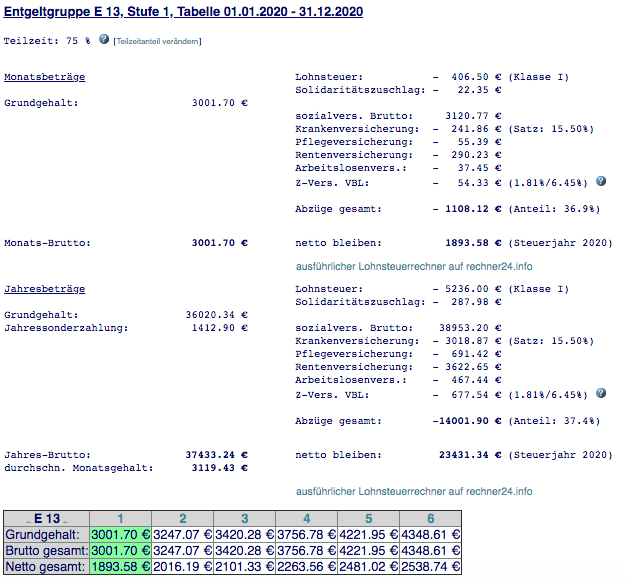
In this particular case, the monthly gross salary is 3001.70 Euro/month while the net salary is 1893.58 Euro/month (both are highlighted in Green at the bottom of the picture. In the second column from the right, the following information is detailed:
Lohnsteure (Income tax) of Klasse I (class I): 406.50 €
Solidaritätszuschlag (Solidarity surcharge): 22.35 €
Sozialvers. Brutto (Natioanl/Social Insurance pre-tax):
Krankenversicherung (Health Insurance): 241.86 €
Pflegeversicherung (Nursing Care Insurance): 55.39 €
Rentenversicherung (Pension Fund): 290.23 €
Arbeitslosenvers. (Unemployment Insurance): 37.45 €
Z-Vers. VBL: 54.33 €
Z-Vers. stands for “Zusatzversorgung des öffentlichen Dienstes” is compulsory insurance. VBLklassik ensures that you receive a company pension in addition to the statutory pension. The rest of the column is exactly a similar calculation for a year!
However, if you are married and your partner is not on a paid job, you can change your tax grade (Lohnsteuerklasse) to III. Let’s see how does it affect your net income (take-home money).
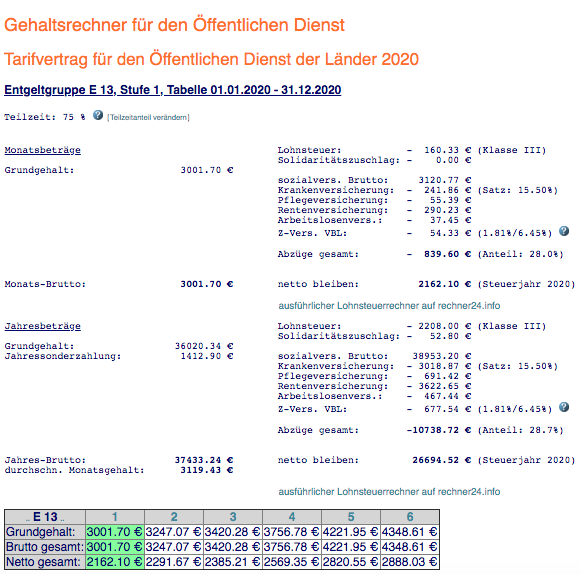
As you can see in the picture above, your net income becomes 2162.10 Euro per month which is 268.52 Euro per month more than a person in tax-class I!
Example: PhD student with contract TV-L E13 (50%)
In this example, we consider a single PhD student (Lohsteuerklasse I) with TV-L E13 (50%). As explained in the previous section, upon entering the corresponding values to the calculator, you will see a page as shown below.
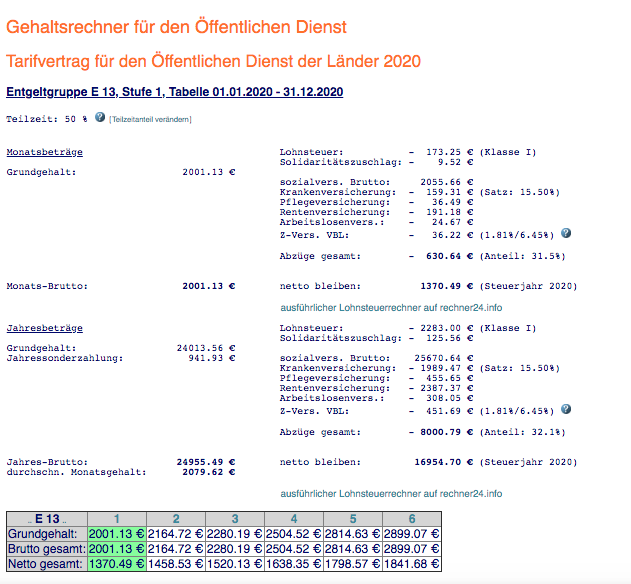
You can see the meaning of the terms in the previous sub-heading. the monthly gross salary is 2001.13 € while the net salary is 1370.49 € (both are highlighted in Green at the bottom of the picture.
However, a married student whose/her partner is not on a paid job can take home more as shown in the following picture.
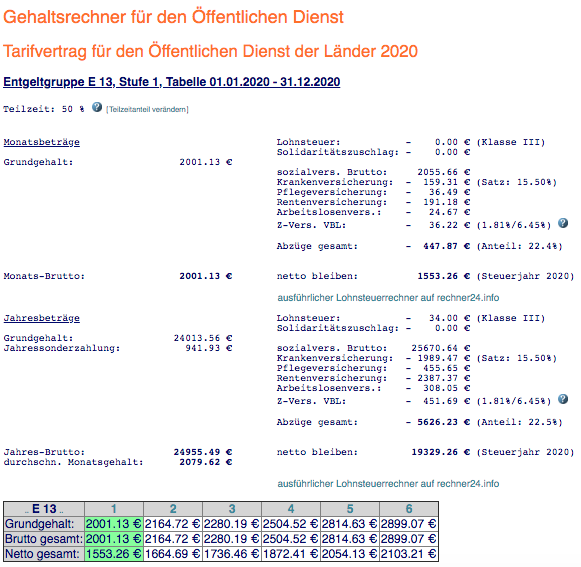
As you can see in the picture above, your net income becomes 1553.26 Euro per month which is 182.77 Euro per month more than a person in tax-class I!
Example: PhD student with contract TV-L E13 (100%)
Let’s look at the example of a PhD student with a TV-L E13 (100%) contract. The results are as follows:
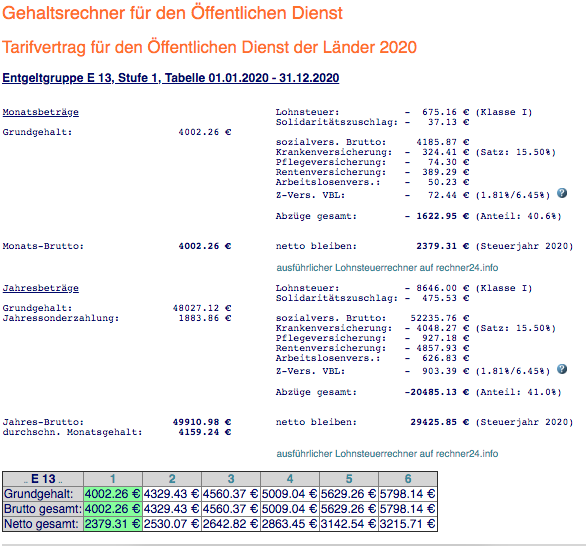
In this case, the gross (before-tax) and net (after-tax) salaries are 4002.26 and 2379.31 Euro per month, respectively.
Again, a married student whose/her partner is not working can take home more by paying less tax (see image below).
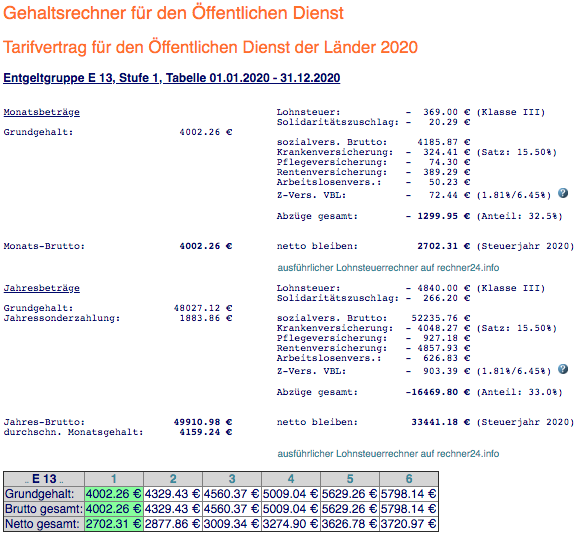
So, for a married employee with TV-L E13 (100%) which is on Lohnsteuerklasse III, the gross (before-tax) and net (after-tax) salary are 4002.26 and 2702.31 Euro per month, respectively. Note that you can see the corresponding salary for the same contract when your “stuff” rises to 2, 3, 4 or 5.
Example: Postdoc with contract TV-L E13 (100%)
As explained earlier, if your employee put you on “stufe” 1, your net salary is exactly as the one shown above. However, if you are on “Stufe” 2, 3 or 4, your salary becomes much higher. The picture below shows the salary of a Postdoc with TV-L E13 (100%) on Lohnsteuerklasse I.
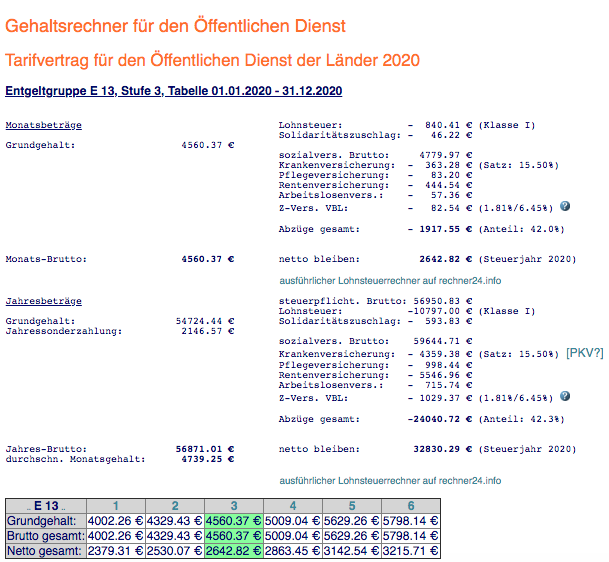
Here, the before-tax monthly salary is 4560.37 Euro whereas the after-tax money is 2642.82 Euro. For the same person but on Lohnsteuerklasse III (married postdoc whose partner is not working), the picture below shows the salary details.
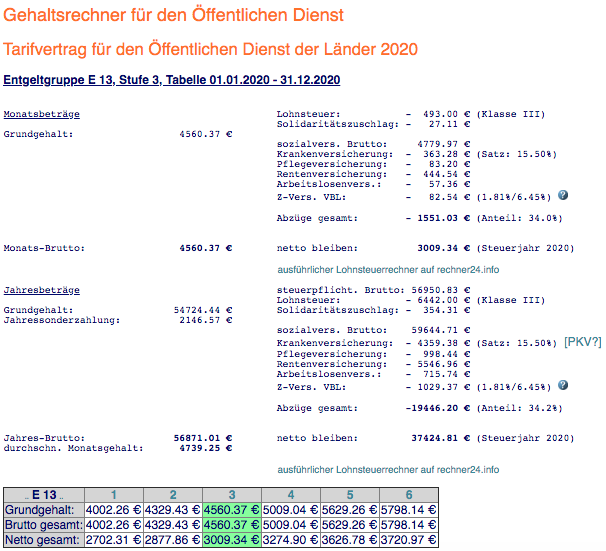
In this case, the monthly net salary (after tax) is 3009.34 Euro. This is almost 358 Euro more than the same postdoc but on Lohnsteuerklasse I.
Hope that will help you to understand all you need to know about PhD students and Postdocs’ salaries in Germany in 2023.
Available Fully Funded PhD and Postdocs in Germany
Below are other German universities with academic positions available (PhD and Postdoc:
- Fully Funded Master, PhD and Postdocs at Max Planck Institutes
- Available Fully Funded PhD and Postdoc Positions at University of Stuttgart
- Fully funded PhD and Postdoc Position at the University of Hamburg
- EU Funding of PhD and Academics in Germany
- Fully Funded Master, PhD and Postdocs at Helmholtz Centers
- Fully funded PhD and Postdoc Positions at the Berlin Institute of Technology
- Fully funded PhD and Postdoc Positions at the Aachen University (RWTH)
- Fully Funded PhD and Postdoc Positions at the Technical University of Munich
- Fully Funded PhD and Postdoc Positions at the University of Cologne
- Fully Funded PhD and Postdoc Positions at University Bremen (univ Bremen)
- Fully funded PhD and Postdocs at Tuebingen University
- Ludwig Maximilian University of Munich (LMU) PhD and Research Vacancie
- Karlsruhe Institute of Technology (KIT) PhD Jobs
- Available Fully Funded PhD and Postdocs at Freiburg University
- Available PhD and Postdoc Vacancies at Free University of Berlin
Interested in discovering the salary figures for PhD and postdoctoral positions in Europe?:
- PhD Salary in Denmark
- Postdoc Salary in Denmark
- Salary of a PhD student and Postdoc in Norway
- PhD Salary in Switzerland
- Salary ladder for PhD students in Sweden
- Salary of PhD student and Postdoc in Germany
- Salary of PhD and Postdoc in Ireland
- Salary of Postdocs in France
- Salary of PhD student and Postdoc in the UK
- Professors’ salary in the UK
- Salary of PhD student and Postdoc in the Netherlands
- Salary of PhD student and Postdoc in Finland
- Salary of PhD student and Postdoc in Austria
- Salary of Marie-curie postdoctoral fellowship
- Salary of PhD student in Marie-Curie ITN
- Doctorate Degree Business Administration Salary
Fully Funded PhD Positions with Salary
- Germany – Fully Funded PhD
- Switzerland – Fully Funded PhD
- Denmark – Fully Funded PhD
- UK – Fully Funded PhD
- Sweden – Fully Funded PhD
- Finland – Fully Funded PhD
- Netherlands – Fully Funded PhD
- Norway – Fully Funded PhD
- Belgium – Fully Funded PhD
- Austria – Fully Funded PhD
- Australia – Fully Funded PhD
- France – Fully Funded PhD
- New Zealand – Fully Funded PhD
- Canada – Fully Funded PhD
- USA – Fully Funded PhD
- Luxembourg – Fully Funded PhD
- Spain – Fully Funded PhD
- Italy – Fully Funded PhD
- Iceland -Fully Funded PhD
We will update all different types of academic positions, so if you’re looking for a position, think about checking out our Home Page and our Academic Jobs page . You can also follow us on Facebook to be the first to know when we post any new vacancies. But if you are not a fan of reading text, and instead prefer to watch, join our PhD and Postdoc-related videos on our Youtube Channel .
- PhD degree in Austria
- PhD in Austria
- PhD in Belgium
- PhD in Canada
- PhD degree in Denmark
- PhD in Finland
- PhD Programs in France
- How to apply for a PhD in Germany?
- PhD in Iceland
- PhD in Italy
- PhD in Luxembourg
- PhD in Netherlands
- PhD in New Zealand
- PhD in Norway
- PhD in Spain
- PhD in Sweden
- PhD Degree in Switzerland
- How to apply for PhD in UK?
- EU Funded Positions in Australia
- EU Funded Positions in France
- EU Funded Positions in Germany
- EU Funded Positions in Luxembourg
- EU Funded Positions in Spain
- EU Funded Positions in UK
- PhD in Biology
- PhD in Business and Finance
- PhD in Computer Sciences
- PhD in Education
- PhD in Engineering
- PhD in Law and Social Sciences
- PhD in Health and Medicine
- PhD in Psychology
- PhD in Sciences
- Undergraduate and Postgraduate Scholarships at Deakin University
- PhD Scholarship and Postdocs at Australian National University
- 600 Scholarships at University of Melbourne
- Scholarships at the Center for Quantum Technologies
- International fellowship of Cancer Research Institute
- Fully Funded Joint PhD and Academic Jobs at University of Melbourne
- Scholarships in Canada
- Scholarships in Iceland
- Renault Foundation Scholarships
- DAAD Research for University Academics
- DAAD Architecture Scholarship
- Graduate Music Scholarships (DAAD)
- DAAD Art Scholarship
- DAAD Bilateral Exchange of Academics
- DAAD scholarship Development-Related (EPOS)
- DAAD scholarship for Iranian students
- DAAD University Summer Courses
- DAAD Working Internships in Science and Engineering (WISE)
- How to write a good Marie Curie project proposal?
- Chevening Scholarship (UK)
- Rhodes Scholarships For international students
- University of Manchester Scholarships
- Scholarships and Academic Jobs at University of Birmingham
- Google Scholarships
- Newton Fellowship
- Scholarships at British Private Post University (BPP Scholarships)
- Undergraduate Scholarships at Trinity College Dublin in Ireland
- Postgraduate Scholarships at Trinity College Dublin
- Scholarships and Postdoc Jobs at Boston University (BU)
- Institute for Advanced Study Funding and Fellowships
- Scholarship Universe Purdue
- Scholarships at Our Lady of the Lake University
- Scholarships and Awards at Bellarmine University
- Google Scholarship, Internships and Fellowships
- Scholarships for international students at Lincoln University
- Scholarships at Rider University in USA
- James S. McDonnell Foundation Fundings in the USA
- Coca Cola Scholarship
- PEO International Scholarships, Grant and Loan
- Scholarships at University of Texas at Arlington (UTA Education)
- Scholarships for South Asian Citizens
- Udacity Scholarships
- Student Loan
- How to find a Postdoc Position?
- Postdocs in Austria
- Postdocs in Belgium
- Postdocs in Canada
- Postdocs in Denmark
- Postdocs in Finland
- Postdocs in France
- Open Postdoc Position at the RWTH Aachen University Hospital (Aachen, Germany)
- Postdocs in Italy
- Postdocs in Luxembourg
- Postdocs in Netherland
- Postdocs in New Zealand
- Postdocs in Norway
- Postdocs in Spain
- Postdocs in Sweden
- Postdocs in Switzerland
- Postdocs in the UK
- Postdocs in the USA
- Comparison of Salary of PhD Students in Europe
- Comparison of Salary of Postdoc in Europe
- Salary of PhD and Postdocs in Austria
- PhD and Postdoc Salary in Luxembourg
- Salary of PhD and Postdocs in Finland
- Salary of PhD and Postdocs in France
- Salary of PhD and Postdocs in Germany
- Salary of PhD and Postdocs in Ireland
- Salary of PhD students in Marie-Curie ITN
- Salary of Marie Curie Postdoctoral Fellowship
- Top 20 countries with the highest salary of Marie-Curie Fellowship
- Salary of PhD and Postdocs in the Netherlands
- PhD and Postdoc Salary in Norway
- Salary of PhD students in Switzerland
- PhD Salary in UK
- Comparing Postdoc Salaries in the UK
- Academic Email: How to email a Professor for inquiry?
- Application Letter (also known as cover letter)
- Six essential steps to get your article published
- How to write a strong Application Letter?
- How to prepare an eye-catching CV for academics?
- How to write a good project proposal?
- Cover Letter Preparing Service
- Interview Questions of Academic Position
- IELTS Listening Test
- IELTS Reading Test
- How much does it cost to live in Switzerland as a student?
- How much does a university cost in Switzerland?
- How much does it cost to study in Sweden?
- How much does it cost to live in Sweden as a student?
- How to apply for a master’s degree in Canada?
- How much does it cost to study in Austria?
- How much are the tuition fees in Denmark?
- How much does it cost to live in Germany?
- Bachelor in the UK
- Master’s Degree (MS) in the USA
- Best Master of Public Health (MPH) Programs
- Master degree in Austria
- Master Programs in the UK
- Master’s degree in Denmark
- How can you study MSc/PhD in Germany without Funding?
- How much does it cost to study in Germany?
- Best city to study in Germany
- PhD Degree Requirements
- Top Online MSW Programs
- Online Colleges with Financial aid in different study subjects
- Business Free online courses
- Online MBA Scholarships
- Online MBA in the UK
- Online Master of Public Health (MPH) at Baylor University
- Baylor University Online Programs
- Purdue Health and Nursing Online Master Degrees
- Purdue University Online MBA
- Computer and Information Technology Purdue University (Online)
- Top 10 Online Nurse Practitioner Programs
- Fastest and Cheapest RN to BSN Online
- Online Doctorate in Nursing
- Online Criminal Justice Degree
- Harvard Business School Free Online Courses
- Computer Sciences free online Programs
- Free online Programs in Data and Engineering Science degree
- Online Medical and Health Free courses
- Education and teaching free online courses
- Online Doctoral programs in Higher Education Administration
- Online PhD Programs at Liberty University
- Top Online Program at West Coast University
- Online PhD Programs at Grand Canyon University
- Fastepo’s Golden Service
- Finding Position or Scholarship
- CV Preparing Service
- Advertise on Fasteo
- EDI Statement for Fastepo
- { expandedNavigation=true; activeIndex=0; }"> Research landscape
- { expandedNavigation=true; activeIndex=1; }"> Your goal
- { expandedNavigation=true; activeIndex=2; }"> Plan your stay
- { expandedNavigation=true; activeIndex=3; }"> Success stories
- { expandedNavigation=true; activeIndex=4; }"> Our service
- R&D policy framework
- Research infrastructure
- Research funding system
- Universities
- Universities of applied sciences
- Technical universities
- Top universities
- Fraunhofer-Gesellschaft
- Helmholtz Association
- Leibniz Association
- Max-Planck-Gesellschaft
- Academies of sciences and humanities
- Federal institutions
- State research institutions
- What is R&D in German business?
- Why is collaboration important?
- Which sectors carry out R&D?
- Which are the leading companies?
- How do German businesses compare internationally?
- How is the start-up scene set up?
- How do I start a career?
- Good reasons
- Two ways to get your PhD
- Find your PhD position
- How to apply for a PhD
- Funding programmes
- Funding organisations
- Funding databases
- Job portals
- Career options & dual careers
- Funding & awards
- Potential employers
- Research fields
- Entry and residence
- German money-saving tips
- Cost of living
- Social insurance and health
- Bringing your family
- Information for your partner
- Support for families
- Finding a place to live
- Funding opportunities
- Recognition of professional qualifications
- Counselling
- Latest Thinking
- First-hand experiences from international researchers
- On-site consultation
- Our publications
- Research news
- Online talks
- Topics in focus
What you will earn as a researcher in Germany will naturally depend on your specific situation – for example on your research profile and your experience. However, your expertise as a researcher or academic will be highly valued in Germany and will therefore earn you a good salary .

iStock.com/Hiraman
State universities and publicly financed research institutions will pay you in line with – or on the basis of – predefined salary scales. Professors may receive various additional payments on top of their basic salary, for example for specific responsibilities that are negotiated on a case-by-case basis. Salaries are adjusted for inflation from time to time.
Germany has a federal system. The individual federal states are responsible for paying their university lecturers and academic staff.
Consequently, salaries vary from one state to another. Salaries in industry can differ considerably from those in academia. If you are employed at management level, set pay scales will usually not apply to you, and you will negotiate your own salary.
How much does a postdoc earn?
Postdoctoral researchers at state universities and publicly funded research institutions are paid in line with the collectively agreed salary scale. Their pay grade will depend on their responsibilities and experience.
- Postdoctoral researcher*: 4,500 – 4,900 euros
- Head of independent junior research group**: 5,000 – 6,300 euros
Monthly basic salary, gross, rounded, 2022 The ranges given indicate the gross basic salary based on the collective agreement that applies in most German states for the following pay grades: *Remuneration Group 13 Grade 3 – Remuneration Group 14 Grade 2 ** Remuneration Group 14 Grade 5 – Remuneration Group 15 Grade 4
Source: Tarifgemeinschaft deutscher Länder (TdL) [German ]
How much does a professor earn?
As a rule, professors are paid according to salary groups W3 or W2, while junior professors are in salary group W1. The university itself decides whether to establish a W3, W2 or junior professorship.
- Junior professor (W1): 4,800 – 5,400 euros
- Professor (W2): 5,500 – 6,900 euros
- Senior professor (W3): 6,700 – 7,800 euros
Monthly basic salary, gross, rounded, 2023; additional payments may apply. Salaries vary according to federal state.
Source: Deutscher Hochschulverband (external link to PDF, 162 KB) [German]
Good to know
Postdocs and research associates at state universities and publicly funded research institutions are paid according to a salary scale agreed between the federal states or the federal government and the unions. Public-sector employees at state level are paid according to the TV-L scale (see above), while the TVöD/Bund scale [German] applies to federal employees .
The remuneration for professors in Germany is known as W-Besoldung , a salary scale for scholars (W stands for “ Wissenschaft”, which means science). This salary scale provides for additional performance-related payments on top of the basic salary.
The Academic Fixed-Term Contract Act (Wissenschaftszeitvertragsgesetz) generally applies to academic staff at state universities and research institutions. It stipulates that academics can be given fixed-term contracts for a maximum period of twelve years: as a rule, up to six years before a PhD and a further six after (or nine in the case of medicine). This does not apply if the fixed-term post is funded by a third party – in this case there are no maximum periods.
More Information
- Information on the salaries of university teaching staff by the German Association of University Professors and Lecturers (Deutscher Hochschulverband) [German]
- Table with the current salaries for young researchers by the Tarifgemeinschaft deutscher Länder (tariff community of the german states) [German]
- Information from Germany’s education sector union (Gewerkschaft Erziehung und Wissenschaft) on the collective labour agreements [German]
Higher pay for doctoral researchers
Max Planck funding contracts remunerated according to the DFG funding rates since 1 January 2021
What had been prepared over a long period of time has finally come to fruition: the Joint Science Conference (GWK - Gemeinsame Wissenschaftskonferenz ) has granted the Max Planck Society its approval to apply the DFG-German Science Foundation’s gold standard in compensation for doctoral researchers. The new contract details were published on December 14, 2020 within the Max Planck Society's Organisational Manual (OHB).

Whether in the library, lab, or in field work - in future, all doctoral students will be paid at least 65 per cent of TVöD 13.
© Stígur Már Karlsson / Heimsmyndir / istock
As of January 1, 2021, all doctoral researchers with Max Planck funding contracts will be compensated according to the DFG’s funding rates. This applies to both new and already running contracts, which will be adjusted accordingly. If there are delays in signing contracts due to home office regulations caused by the Covid-19 pandemic, for example, the regulation and payment will be applied retroactively. In addition, institutions may also set higher basic salaries to reflect subject-specific remuneration. The possibility of individual recruitment boni will remain unaffected by the new regulation.
The new regulation will apply to all Max Planck Institutes throughout Germany, as well as the Netherlands and Italy. The Institutes are expected to cover the increased costs for their own doctoral researchers from their local budgets.
"Currently centrally funded Max Planck Research Groups, which are in particular open-topic Max Planck Research Groups, Lise Meitner Groups, Minerva Max Planck Research Groups as well as Otto Hahn Groups, however, receive an annual grant of 7,500 euros per group. The same is provided for the ongoing, so-called institute-based Max Planck Research Groups. International Max Planck Research Schools receive a one-time grant," adds Ilka Schießler-Gäbler from the Department of Human Resources Development and Opportunities at the Administrative Headquarters in Munich.
"The new contract regulations are a great step forward as they will not only ease the financial situations of PhD students, but also bring more equality to the salaries of doctoral researchers because they reduce the Section- and gender-specific pay gaps – a discrepancy which was also reflected within the last PhDnet surveys", said Lea Heckmann, the new PhDnet spokesperson of 2021. "We're very pleased that this milestone of improving the situation for doctoral students has now been reached. We're very grateful to the many generations of PhDnet steering committees who have driven this project, as well as the staff at the MPG’s Administrative Headquarters and the General Secretary Rüdiger Willems, who have been instrumental in paving the way for this progress", summarized former PhDnet spokesperson Lindsey Bultema.
Other Interesting Articles

“It’s a challenge we need to be tackling right now”
Positive developments in the representation of female scientists across various stages of scientific careers
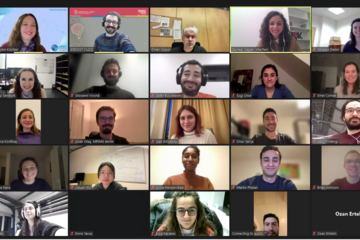
Support project for students in Turkey and Syria in earthquake-affected regions
MAXminds Mentorship initiative to aid affected university students in their careers

Prestigious ERC funding for 20 Max Planck researchers
The European Research Council (ERC) awards 20 Starting Grants to the Max Planck Society, ten of them to female researchers
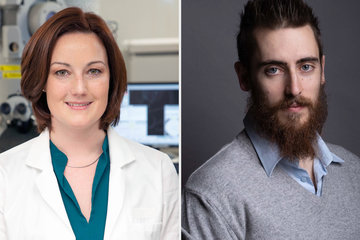
Doubly successful
The German Research Foundation recognizes Bonnie J. Murphy and Giulio Malavolta with the Heinz Maier-Leibnitz Prize
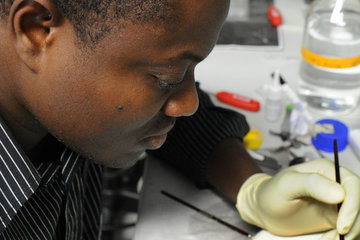
Max Planck Humboldt Programme in Africa
Support for research locations in African countries
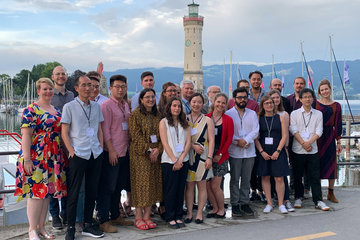
Meeting point Lindau
After two years of online only encounters, the Lindau Nobel Laureate Meeting 2022 took place onsite again
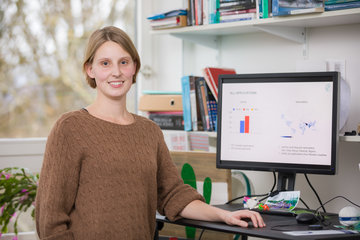
Opening doors for equal opportunities
PhD student Franziska Bröker from the Max Planck Institute for Biological Cybernetics initiated the CaCTüS Internship programme for less advantaged students

Living diversity - but how?
How do you successfully develop a long-term strategy for a diverse and inclusive culture? The MPI for Psycholinguistics has set up a local working group to tackle this challenge

“We need a cultural change to remain competitive”
Asifa Akhtar is Vice President of the Max Planck Society and head of the Max Planck Presidential Commission on Equal Opportunities. In this interview, she talks about her engagement for a cultural change towards more diversity and inclusion at the Max Planck Society. A plea to dare more diversity and inclusion.

Positive Interim Evaluation of the Max Planck Schools
From December 2020 to April 2021, a panel of experts led by Prof. Karl Max Einhäupl, former chairman of the German Council of Science and Humanities and former CEO of Charité Universitätsmedizin Berlin, conducted an evaluation of the Max Planck Schools
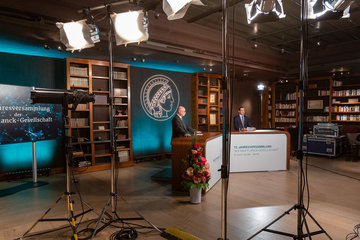
Digital Annual Meeting of the Max Planck Society 2021
The Max Planck Society's members and committees are meeting digitally again for their Annual Meeting

Max Planck Schools expand network of Fellows
As of October 01, 2021 onwards, 120 Fellows reappointed and 14 newly appointed
Notification Settings

- Universities

Salary and Social Security
You will receive ample support as a researcher in Bavaria. With a good salary and a comprehensive social security system, you will be able to enjoy a comfortable lifestyle. Of course, incomes vary based on your level of responsibility and work experience. Similarly, the cost of living will depend on your personal choices and family situation.
Salaried Positions for Researchers
The pay you receive depends on several factors, but researchers at all levels receive good support in terms of monthly income, insurance, and additional support for research equipment and supplies.
How to Decipher the German Pay Scale
Public employees, like university researchers, are paid according to a standard state and federal pay scale. For a university position in Bavaria, it is the TV-L pay scale. TV-L stands for Tarifvertrag für den öffentlichen Dienst der Länder , the bargaining agreement for public employees of German states.
Each salary level is assigned a number, which refers to the pay you will receive based on your qualifications and experience. The “E” means Entgeltgruppe , or salary group.
Most doctoral positions and some postdoc positions will be categorized as TV-L 13, which can range from about €4100 to €6000 (gross monthly salary). The exact salary is determined by your years of experience.
These positions involve significant managerial responsibilities. They pay anywhere from €4500 to €6400 (gross monthly salary). The precise amount depends on the amount of experience you have.
This is the recommended pay grade for leaders of research groups, but the final decision lies with the institution employing you. The salary ranges from approximately €5000 to €7000 (gross monthly salary).
Fellowships and Scholarships in Germany
PhD candidates and postdocs in Bavaria can finance their research with postgraduate funding in the form of scholarships, or other external funding such as fellowship grants. These funds generally provide enough income to cover things like living expenses, social security contributions, and your research and its related costs.
PhD funding in Bavaria
Doctoral candidates who are scholarship recipients receive a monthly stipend. Your scholarship foundation might also provide funding for books and research materials. In addition, you can often request money for conferences (travel costs, accommodation, conference fees). You will often benefit from the foundation’s program for fellowship recipients, which may include workshop and networking events.
There are no deductions for taxes or insurance from your monthly stipend. But that means you will need to take care of insurance matters yourself. Health insurance is mandatory for everyone who lives in Germany.
Postdoc funding and fellowships
Postdoctoral researchers often apply for external grants to fund their research . Depending on the type of grant, funding might cover expenses for equipment and staff—including their own position—as well as health insurance and other social benefits, travel, and even a family allowance. You should clarify the terms of your grant with the awarding organization. If you receive third party funding, your university will be able to advise you on the financial aspects of project management. Universities also usually manage administration of the grant or offer support in this regard.
Professors’ Pay Scale
Currently, different levels of professorship are designated according to their salary level, which is determined by state regulations. You will see these levels advertised in job announcements. Professorial positions are ranked as W1, W2, or W3—the W stands for Wissenschaft , which means science.
W1 Junior Professors
W1 professors are at the beginning of their career as professors. These positions are a stepping-stone to W2 and W3 positions. Junior professors are sometimes starting tenure-track professors. The salary is around €5000 (gross monthly salary).
W2 and W3 Professorships
For W2 professorships, the monthly salary ranges from €6200 to €6900 (gross monthly salary). For W3 professorships, it ranges from €7400 to €7900 (gross monthly salary).
When you are offered an appointment as a W2 or W3 professor , you will have the chance to negotiate your salary and make provisions regarding performance bonuses. You will also be able to negotiate aspects such as staffing and workplace set-up. Additional funding for your research can come from external agencies.
Social Security and What Tax Contributions Cover
Bavaria is a safe place with a high standard of living. Part of that safety comes from the social security system and the extensive public services that your taxes make possible. As an employee, you contribute part of your earnings to various insurance funds, including health insurance, accident insurance, and unemployment for example. So, if something unexpected happens, you are in good hands.
Social security payments
As an employee, your monthly contributions cover:
- Health insurance , so you don’t have to worry about doctor’s fees, hospital bills, or prescription medicine costs.
- Long-term care insurance , in case you need special medical care over an extended period.
- Retirement insurance , so you have income after you retire. Some countries have reciprocity with Germany. This means that pension paid abroad can be transferred to Germany.
- Unemployment insurance , so you don’t have to worry about transition phases between jobs.
- Accident insurance , in case something unexpected happens.
Professors in Germany are usually civil servants, which means social security, health care, and pension plans work a bit differently for them. They receive higher salaries and must purchase private health insurance. (However, 50–80% of these costs are refunded.) They also receive more substantial retirement benefits.

What your taxes do for you
In Germany, you will experience a high quality of life and relatively low living costs, compared to other research hotspots. While it is true that taxation in Bavaria is a bit higher than you might find in some other countries, these costs are offset by access to excellent services—and to numerous well-paying jobs, thanks to Bavaria’s position as a dynamic business hub.
Public Services in Bavaria

Free public schooling...
Not only is the standard of education in Bavaria excellent, but all public schooling and tertiary education is free.

... and subsidized child care
You will also have access to high-quality subsidized childcare. Your institution might even offer childcare facilities on campus.

Well-connected public transportation
Excellent public transport makes getting around easier than ever. Take advantage of Bavaria's well-connected network of buses, trams, and trains.

Support for arts and culture
Bavaria is a true cultural gem, with a rich program of concerts, theater performances, gallery and museum exhibitions, festivals and more.
What to Read Next
- > Routes for Research
- > How to Find a PhD Position
- > How to Finance your PhD
- > Requirements
- > The German Language
- > Health Insurance
- > Renting Apartment or Room
- > Universities
- > University of Applied Sciences
- > Engineering
- > Non-Engineering
- > Blue Card
- > Get Help From Us
- > Contact Us
Apply For A PhD
- > PhD Positions
- > Post-Doc Positions
In most cases PhD and PostDocs will be paid based on TV-L or TVÖD in the 13th group (E 13). In some cases for PostDocs E 14 could be offered.
A partial payment is generally possible and sometimes is the case.
For E 13 you could find the detailed information about the payment by clicking on the salary.
Having E 13 salary payment, you could apply for a blue card in Germany.
To calculate PhD salary you could visit here .
© 2019. Apply4PhD. All Rights Reserved.
Your browser is not supported
Sorry but it looks as if your browser is out of date. To get the best experience using our site we recommend that you upgrade or switch browsers.
Find a solution
- Skip to main content
- Skip to navigation
- hot-topics Extras
- Newsletters
- Reading room
Tell us what you think. Take part in our reader survey
Celebrating twenty years
- Back to parent navigation item
- Collections
- Water and the environment
- Chemical bonding
- Antimicrobial resistance
- Energy storage and batteries
- AI and automation
- Sustainability
- Research culture
- Nobel prize
- Food science and cookery
- Plastics and polymers
- Periodic table
- Coronavirus

- More from navigation items
Wage rise for Max Planck PhD candidates approved
By Kira Welter 2021-02-15T09:30:00+00:00
- No comments
From January 2021, all doctoral researchers with Max Planck funding contracts are entitled to a higher basic salary that matches the standards of the German Science Foundation DFG . The new wage was recently approved by the Joint Science Conference – a meeting of Germany’s national and local science and finance ministers – and applies to Max Planck doctoral candidates in the country and abroad. The agreement also reduces the gender pay gap.
Christina Beck , head of communication at the Max Planck Society ( MPG ), explains that the minimum payment is based on the wage agreement for the public sector ( TVöD ), with all doctoral candidates now receiving at least 65% of TVöD 13 – around €2674 (£2348) gross per month – instead of the 50% many of them received before. ‘As a research institution funded by the federal and state governments, the MPG is obliged to follow this pay scale for doctoral researchers,’ she says. ‘Current funding contracts with a remuneration below this basic amount will be adjusted.’
But the starting salary can be even higher for particularly competitive research areas and in some cases the candidates may also receive a recruitment bonus. ‘All components can accumulate to a maximum of 100% TVöD,’ Beck says. ‘In addition, a special annual payment can be made to all doctoral candidates at a Max Planck Institute.’
The wage increase applies to institutes in Germany, the Netherlands and Italy. Lea Heckmann , the spokesperson for Max Planck’s doctoral network PhDnet , notes that around 3400 doctoral researchers will benefit from it. Recent PhDnet surveys suggested that one in five of them relies on additional monetary support, she says. ‘Financial insecurity is increased by short-duration contracts or stipends with often far lower salaries.’
Heckmann believes that the higher basic salary will also help to reduce the current gender pay gap, which she says is around €93 per month. ‘We do expect a significant decrease with the recently applied change to 65% contracts since one of the major driving factors is probably the pay gap between disciplines,’ she says. ‘50% contracts were far more abundant in institutes focusing on human sciences, which have a majority of female doctoral researchers, than in those focusing on natural sciences, which show a majority of male doctoral researchers. But we have to wait for our next survey to confirm this.’
The new compensation system agrees with the funding rates introduced by the DFG in 2009 to make doctoral research in Germany more attractive and internationally competitive, a DFG spokesperson told Chemistry World . ‘Good employment conditions contribute to the attractiveness of scientific careers, and a fair and transparent salary system enhances the degree of satisfaction that researchers feel with their job situation. Moreover, the fact that the DFG, as Germany’s biggest research funding organisation, and its partners, the research performing organisations, have harmonised their salary rates, makes it easier for international scientists to orientate themselves in the German academic landscape.’
- Research institutions
Related articles

Smarter experimentation for scientists and engineers
Sponsored by JMP

Researchers condemn UK funder’s decision to curb PhD extensions
2020-11-20T14:42:00Z
By Katrina Krämer

Javier Milei is proving to be the ‘nightmare’ Argentinian researchers feared
2024-05-24T08:08:00Z
By Rebecca Trager

Expressions of concern added to more than 60 articles in chemistry journal
2024-05-20T08:30:00Z
By Julia Robinson

Diversifying the PhD
2024-05-17T13:35:00Z
By Emma Pewsey
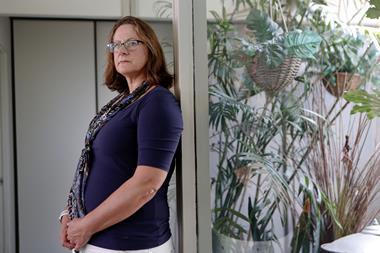
Integrity specialist has no case to answer over blackmail, extortion allegations, French officials find
2024-05-16T13:30:00Z
By Dalmeet Singh Chawla
No comments yet
Only registered users can comment on this article., more from news.

Simple preparation method improves access to long-known superacid
2024-05-24T13:30:00Z
By Jamie Purcell

Promethium bond length completes picture of the size of lanthanides’ atoms
2024-05-24T08:30:00Z
By Kit Chapman

Simplified hydroformylation replaces rhodium with base metal
2024-05-23T14:03:00Z
By Victoria Atkinson

Physical chemistry textbook now free to download as a ‘gift’ to the community
2024-05-23T13:30:00Z

What the dichloromethane ban might mean for university labs in the US

How A-level chemistry solved the 200-year-old problem with the haloform reaction
2024-05-23T08:30:00Z
- Contributors
- Terms of use
- Accessibility
- Permissions
- This website collects cookies to deliver a better user experience. See how this site uses cookies .
- This website collects cookies to deliver a better user experience. Do not sell my personal data .
- Este site coleta cookies para oferecer uma melhor experiência ao usuário. Veja como este site usa cookies .
Site powered by Webvision Cloud

Ph.D. Stipend in Germany: Things you need to know
Table of Contents

All countries provide some form of financial aid to Ph.D. students , but Germany places a premium on doctorate research. The variety of ways you can accomplish a Ph.D. in Germany is reflected in the various forms that German Ph.D. financing might take. The nation’s Ph.D. programs are well-organized and have a practice-oriented curriculum, offering students the chance to study a subject from the ground up.

In Germany, the most searched Ph.D. programs are in mathematics, computer science, physics, economics, and engineering. International students have the freedom to complete their English-language Ph.D. theses and easily transition into their chosen fields of employment. Learn more about Ph.D. scholarships .
Furthermore, conventional academic scholarships and fellowships are frequently used to support doctoral students, but German universities and research institutions also provide salary assistantships for Ph.D. researchers. Doctoral students take between 46,000 and 56,000 EUR gross ( INR 36,61,472 to INR 44,57,444 ) per year based on full-time employment, depending on the amount of prior experience the doctoral student has.
Ph.D. Stipend in Germany for International Students
Internship applications are accepted by foreign students both during and after graduation. You can apply for internships at the university as a research assistant in the lab or a professor’s assistant while enrolled in a degree program. Here, we’ve outlined some key details about the German Ph.D. student stipend:
- German institutions provide a monthly payment to international Ph.D. candidates. In Germany, Ph.D. students receive an annual income of 24,500 EUR (about INR 19,53,189).
- In addition to pursuing a Ph.D., one can work as an intern at public and commercial organizations for an average salary of 500 EUR per month (about INR 39,848 per month).
- Since employment agreements that last less than a year do not count as relevant professional experience, doctoral students with little or no experience should confirm that their bond lasts for at least 12 months.
Job & Salary After Ph.D. in Germany
The salary of a student after earning a Ph.D. is based on a number of things. Industry, years of experience, candidate talents, and job positions are among these crucial considerations. We’ve included a few of the jobs available to Ph.D. graduates in Germany along with their typical yearly salary below:
High-Paying Jobs in Germany
After finishing their Ph.D. program at a prestigious university, overseas students can apply for a number of well-paying employment in Germany.
How to Find a Job After Ph.D. in Germany?
Many Ph.D. graduate students choose to live in Germany’s major cities because of the attractive employment environment. Let’s examine the best cities in the nation for foreign students.
- Jobs in the marketing field are reportedly available in Berlin, the German capital.
- Financial industry hubs include Frankfurt.
- Munich’s car industry is well renowned.
Since there is 400,000+ people skilled labor shortage in Germany, Ph.D. grads may easily get employment there. Here are some tips for foreign students looking to work in Germany after earning their degree:
1. Open German Job Sites
One of Germany’s major providers of recruitment services is the Federal Employment Agency. It has more than 700 locations around the nation and offers an international student employment platform called “ International Placement Service. ” In order to get matched with a job vacancy, create a profile on their website and include your qualifications.
2. German private job sites
Ph.D. graduates have access to a variety of websites where they can look for specialized employment.
- Academics for openings in the management industry.
- Staufenbiel and Stepstone for graduate employment and internships.
- Students can also look up startups on Jobooh.
3. German Recruitment Companies
The “ German Yellow Pages ,” which features an employment section called “ Arbeitsvermittlung ” dedicated to recruitment agencies, is another resource for international students who have completed their Ph.D. program at German institutions and are looking for work. For international students, recruiting firms can be trusted if they are members of the Federal Employer’s Association of Personnel Service Providers.
4. Newspapers in German
Look through the employment sections in the Sunday editorials of the following newspapers for academic and government positions :
FAZ or Frankfurter Allgemeine Zeitung
It has the largest newspaper readership in 148 countries in addition to Germany. It is a liberal, conservative journal on the center-right.
Süddeutsche Zeitung
It is published in Munich and is one of the biggest daily newspapers in Germany. It is a center-left, liberal-progressive newspaper .
It is printed in Bonn and serves as the Axel Springer publishing company’s main newspaper daily.
Handelsblatt
The Handelsblatt Media Group is the publisher of this business newspaper in German. Handelsblatt Global Edition is the name of the newspaper’s English-language edition .
One of the top 3 nations in the world to accept more than 30,000 students for Ph.D. programs in Germany. The depth of the Ph.D. courses promotes students’ overall growth and prepares them for the workforce. Additionally, this aids German Ph.D. stipend recipients.
Best Christmas markets in Germany for 2022
How to find an internship in germany, 49 euro ticket-everything you need to know.
Visit our website for more articles related to studying in Germany . Follow us on Instagram and Facebook for more tips & information on studying in Germany.
Share this:
Snigdha Dalua
New 10-euro amsterdam-berlin train and more across europe, german holiday traditions: brückentag, fenstertag, and zwickeltag explained, motorola and lenovo sales ban in germany , how to minimize salary deductions while working in germany, five things to know about salaries in germany, what to expect in germany during euro 2024, flixtrain announces largest expansion in 2024, 7 unmissable events in germany in may 2024, best events in berlin this may 2024, everything that changes in germany in may 2024, 2 german states abolish mandatory covid-19 isolation, fun things to do at christmas time in germany, related articles.

Pros and Cons of Studying in Ireland

How to Find Available Therapists in Germany?

Difference Between EU Blue Card and Residence Permit for Working in Germany

Berlin-Abo: Berlin’s New €29 Travel Pass
Leave a reply cancel reply.
Applying for a PhD in Germany
Well, there are actually some great resources already available about this:
https://www.daad.de/en/study-and-research-in-germany/phd-studies-and-research/
https://www.research-in-germany.org/en/jobs-and-careers/info-for-phd-students.html
But I would nevertheless like to summarise this more specifically for you, the person who found this page, because possibly you would like to apply to a PhD with my lab or in a closely-related research field in Germany.
So, what do you need to know? Firstly, there are two main ways you can get a funded PhD position in Germany: either via advertised PhD positions or via a scholarship .
Advertised PhD positions
What do these look like?
Advertised PhD positions are in every respect considered real jobs in Germany, and will be advertised as either 50% or 65% E13 TV-L or TV-H positions, and sometimes as “research assistant” or “research scientist” rather than explicitly as “PhD position”. “TV-L” and “TV-H” refer to the funding system in the government service ( https://oeffentlicher-dienst.info/tv-l/ ); “TV-H” is the payscale specific to the state of Hessen, and there are also some other state-level variants, but these are basically similar. E13 is the primary “researcher” level: full-time postdoc positions are paid 100% E13. The justification for paying PhD students 50% or 65% of the E13 salary is that the remaining time is used to write the PhD thesis/in training-related tasks. An interesting side-effect of this is that a 50% E13 position could also be a half-time postdoctoral position. Another interesting side-effect is that there is no actual requirement for the employee of an E13 50% or 65% position to complete a PhD, so sometimes this will be advertised as an “option”, e.g. “the researcher will have the opportunity to complete a PhD”. Although the majority of these positions are 3 years, it is also possible to see other timeframes advertised (a single year, 4 years etc.) because this is generally dependent on the project funding available rather than on the requirements of the student to graduate. 50% is the default/minimum, but DFG (German Research Council)-funded projects often pay 65% instead.
English, German or both?
Advertising PhD positions in both English and German is common. However, many advertisements will only be in German: in this case, it is likely the researcher is either not interested in attracting international candidates (boo), or needs German-speakers. The latter case can arise if a PhD position is directly funded by a university, rather than by a grant: such university-funded positions often come with a teaching requirement of 2-4 contact hours per week. Depending on the university and the department, German language may be required to teach into the courses currently being offered. In general, most universities in Germany offer a mix of English and German courses, with German dominating at the undergraduate level and MSc courses often being split between English and German, with some offered courses in English only to attract international applicants. In any case, if you don’t speak German it is probably not advisable to apply for a job listing that is only in German!
How do I find these advertisements?
Positions must in general be advertised on the university job listing websites, usually for a minimum of 2 weeks. The problem with directly applying to these positions is that (as with all jobs, even though this is rarely explicitly stated and is definitely not best practice for improving diversity) the person advertising often already has a candidate in mind for the position. As well, the administrative burden of advertising a position is such that it is not an uncommon practice for researchers who are hiring to wait until they find a good candidate, then advertise the position tailored to this candidate. This is by no means a Germany-specific phenomenon, but it is one that candidates should be aware of. Positions which are advertised for longer periods than the minimum are more likely to be casting a broader net for novel applicants rather than to be specifically tailored for a particular person.
Improving your chances
So, how can you improve your chances of getting an advertised position, particularly if these often go to favoured candidates which are already known to the researcher? Actually, given this tendency of researchers to wait and hire specific candidates they think might be good, this makes it very important to target research groups you are extra-interested in with specific emails. Possibly, researchers may have grants under review or other opportunities available to hire that are not yet advertised. Writing a cold-call research email is something that has been extensively covered by other sources, including the links above, but I would reiterate that the most important thing to demonstrate is that you know about and are interested in the research area of the group you are contacting. Read the webpage of the research group, explain why you find this research interesting, and describe what your previous work was on. Proposing topics will usually be a plus, although be aware that for advertised positions the research topic will likely be constrained by the project, so there may not be too much flexibility in this.
What needs to be in the application?
Applying for an advertised position is a little different in Germany than elsewhere. It’s important to meet expectations in this regard, because otherwise your application may not be seriously evaluated. There are two major differences which really count here. The first is that in Germany there is a standard cover letter format for applications (see e.g. https://www.germany-simplified.com/german-cover-letter/ ; https://www.immigrantspirit.com/perfect-cover-letter-for-germany/ for a general (non-research-specific) overview). Try and follow this convention, although for a PhD position do not worry so much about “what you bring” in terms of skills – if you clearly have experience and interest in the research area this is usually fine. Most researchers won’t expect you to come with a full suite of skills already, this is usually taught during the research period. Maybe this is just a personal preference of mine, but I don’t really take any stated personality attributes that the applicant writes about themselves seriously… I would rather see some information about what you studied, any previous research experience (e.g. the MSc project), and why you think my research is interesting and want to join my group.
The second important thing is that in Germany, it is expected that you provide written reference letters with your formal job application. Can you get away without this, and just write contact details for your references? Maybe, but better not to risk it unless you have to. Two letters are expected (three are fine, but more than that is probably excessive; one is much better than nothing) – they don’t have to be long (1-2 pages seems standard), but for sure should include one from the supervisor of your MSc thesis (or Honours/undergraduate thesis; or both). If you’re not sure if your referee has experience writing these already (most academics will have written these for some reason or other previously, but conventions differ), make sure you are explicit when you ask that this needs to be a formal letter, on institutional letterhead (if possible), and in a pdf or other unalterable document format with a signature from the referee.
Applying for a scholarship (international students)
So what does the scholarship option involve? Fortunately, the DAAD (German academic international exchange service) has this covered, with a lot of information on their website and a comprehensive database of what you can apply for, based on country of origin/residence:
https://www2.daad.de/deutschland/stipendium/datenbank/en/21148-scholarship-database/
Most of these aren’t applicable to domestic (German) students, and usually also not to international students who are already based in Germany. The deadlines vary by country, but there are also contact people per country or region who can help with the applications, as well as a lot of useful information about applying on the website. Make sure to contact any potential supervisor long before the grant application deadline. I would recommend an absolute minimum of two months before the deadline, but anywhere from 3 – 12 months before is pretty much fine, for a yearly deadline. It can take a lot longer to write a proposal than you might think, so don’t leave it until the last minute!
The advantage of having your own scholarship is that you have a lot more options. Most researchers will probably support your application, if you write a good contact email and tell them that this is what you plan, because the money for the scholarship is paid externally, not by the researcher. The project should fit very well to the research group you target though, because experimental reagents are not paid by your scholarship, so ideally you would pick a group which has funded projects you’re already interested in participating in/adding on to. All projects funded by the DFG (German Research Council) are in a public database here: https://gepris.dfg.de/gepris/OCTOPUS?language=en ; some project summaries will be in English and some in German.
Specific formats for scholarship applications vary and should always be checked carefully. Read the instructions, and contact your local scholarship authority representative to make sure everything is clear. Normally the evaluation will be made using a combination of your CV and the project proposal itself.
What are the important things to know about writing a research proposal? This is very similar to writing a grant proposal, for which there is a great deal of information and advice already available online. In brief, clearly state why the research area is important in the introduction (what’s the problem?) then cover what is already known before proposing the specific research question/s you aim to answer which will fill this knowledge gap. Subsequently, provide specific, experimentally testable research objectives and hypotheses, and a detailed experimental research plan you will carry out to test these, including enough information and methodological details that it is clear that these experiments will be achievable (although referencing specific techniques is definitely acceptable). Normally a timeline or Gantt chart is also requested – information on how to prepare these is also findable online, and your prospective supervisor should also be able to advise on approximately how long they think each step will take. Use a reference manager software to save yourself time and prevent the kind of small formatting errors which will make the reviewer lose confidence in your aptitude. There are a number of free ones such as Mendeley.
How do you work out a research proposal question? This can be quite a difficult prospect, and is a lot to ask if you’ve never done it before. In my experience what works best is to have an open back-and-forth discussion with a prospective, interested research supervisor about what you’re interested in. Hopefully, if you pick a supervisor to contact with care, they already have existing projects that you can discuss. The research supervisor should already be very familiar with the literature in the area you are interested in (if they aren’t, consider if this is the best fit for you or if another project or supervisor would work better). So the prospective supervisor may be able to help advise on what research questions are novel and feasible, or may provide a list of directions that they are personally interested in exploring further that you can choose from or build on.
That’s all from me! It took me a while to find most of this out, and I’m sure there are some aspects I’m still unaware of. But I hope it helps applicants applying to do a PhD in Germany.
Share this:

- Already have a WordPress.com account? Log in now.
- Subscribe Subscribed
- Copy shortlink
- Report this content
- View post in Reader
- Manage subscriptions
- Collapse this bar
- Karrieremesse
- Für Arbeitgeber
PhD student (m/f/d) in T cell immunology/immune regulation in allogeneic stem cell transplantation and cellular immunotherapy
Ähnliche jobs.

PhD Student – Immunotherapeutic Targeting of Leukemia-Initiating cells in AML
Bta, mta, pta, cta as research technician - immunotherapy, diagnostics (m/f/d), bta - molecular biology, immunotherapy (m/f/d), postdoctoral fellow (f/m/x) in the areas of cancer genetics, cancer cell biology and cancer immunology, phd student positions in immunology at the university of lübeck, germany (m/f/d), postdoc bioinformatics - immunology, gene expression (m/f/d), postdoc biology, neuroscience - dementia research, immunology (m/f/d).

The role of regulatory T-cells and type-17 T-cells in testicular tumors and testicular inflammation (m/w/d)
Phd student biology - cell biology, protein (f/m/x).

BTA, MTA, CTA - Immunologie, Molekularbiologie (m/w/d)
Phd student – crispr-based optimization of car nk cell therapy for pediatric aml, postdoc bioinformatik - immunologie, data science (m/w/d), phd student biology - neuro-immune interaction (m/f/d), postdoc biologie als wissenschaftlicher mitarbeiter - immunologie, zellbiologie (m/w/d), akademische:r mitarbeiter:in (m/w/x) im bereich advanced biomaterials for cell and gene therapy.
- Datenschutz
Mehr unter www.jobvector.de. Suche mit jobvector ID 213534
Bonn, Nordrhein-Westfalen

Your responsibilities:
- Cell culture and extraction of primary immune cells
- Molecular biology (PCR, gel electrophoresis, RNA and DNA extraction, qPCR)
- FACS analyses
- Immunohistochemistry
- Metabolic assays
- Work with mice (breeding, genotyping, nutritional studies, transfer experime
Your profile:
- Strong work commitment and discipline
- Diploma or master thesis in immunology, biology, biochemistry, biomedicine or similar
- Ability to work independently and as part of a team
- Good English communication skills
- Dynamic, multidisciplinary and international environment with a strong focus on immunology.
- International Immunology Training Program, giving access to state-of-the-art training and workshops on different scientific aspects
- Weekly seminars on immunology and other biomedical topics by national and international speakers
- Possibility to present results at national and international conferences.
- Modern university sport facilities
- Salary according to the German scale TV-L 13 65 % with additional benefits in the public sector such as pension plan and UKB corporate benefits
- Living in an active university city with access to internationally known museums, music and theatre venues and many other cultural possibilities in the Bonn-Cologne area
Applications (in German or English) are considered by email including a CV and the necessary certificates. Additionally, a brief statement of motivation should be attached until 18th June 2024. Dr. med. Tobias Holderried Medizinische Klinik III Labor für experimentelle Stammzelltransplantation und zelluläre Immuntherapie Universitätsklinikum Bonn Venusberg-Campus 1 53127 Bonn Tel.: +49 228 287 17233 email
Venusberg-Campus 1
Nordrhein-Westfalen
Deutschland
- Bergisch Gladbach
- Low- and middle-income countries
This is a list of countries with low-income or middle-income economies. The Organisation for Economic Co-operation and Development (OECD) compiles this information and revises it every three years.
- Share with Facebook
- Share with X
- Share with LinkedIn
- Share with Email
Afghanistan Albania Algeria Angola Argentina Armenia Azerbaijan Bangladesh Belarus Belize Benin Bhutan Bolivia Bosnia and Herzegovina Botswana Brazil Burkina Faso Burundi Cabo Verde Cambodia Cameroon Central African Republic Chad China (People's Republic of) Colombia Comoros Democratic Republic of Congo Congo Costa Rica Côte d'Ivoire Cuba Djibouti Dominica Dominican Republic Ecuador Egypt El Salvador Equatorial Guinea Eritrea Eswatini Ethiopia Fiji Gabon Gambia Georgia Ghana Grenada Guatemala Guinea Guinea-Bissau Guyana Haiti Honduras India Indonesia Iran Iraq Jamaica Jordan Kazakhstan Kenya Kiribati Democratic People's Republic of Korea Kosovo Kyrgyzstan Lao People's Democratic Republic Lebanon Lesotho Liberia Libya North Macedonia Madagascar Malawi Malaysia Maldives Mali Marshall Islands Mauritania Mauritius Mexico Micronesia Moldova Mongolia Montenegro Montserrat Morocco Mozambique Myanmar Namibia Nauru Nepal Nicaragua Niger Nigeria Niue Pakistan Panama Papua New Guinea Paraguay Peru Philippines Rwanda Saint Helena Samoa São Tomé and Príncipe Senegal Serbia Sierra Leone Solomon Islands Somalia South Africa South Sudan Sri Lanka Saint Lucia Saint Vincent and the Grenadines Sudan Suriname Syrian Arab Republic Tajikistan Tanzania Thailand Timor-Leste Togo Tokelau Tonga Tunisia Turkey Turkmenistan Tuvalu Uganda Ukraine Uzbekistan Vanuatu Venezuela Vietnam Wallis and Futuna West Bank and Gaza Strip Yemen Zambia Zimbabwe
Related content
- Discovery research schemes – Q&As for health professionals
- Eligibility information for grant applicants
- Flexible research careers
- Funded people and projects
- Grant conditions
- Grant funding policies
- International sanctions: how they can affect grants
Chief of Staff Salary in Loup City, Nebraska
Chief of staff salary in loup city, ne.
How much does a Chief of Staff make in Loup City, NE? The average Chief of Staff salary in Loup City, NE is $248,936 as of April 24, 2024, but the range typically falls between $199,400 and $304,523 . Salary ranges can vary widely depending on many important factors, including education , certifications, additional skills, the number of years you have spent in your profession. With more online, real-time compensation data than any other website, Salary.com helps you determine your exact pay target.
- Paid Annually
- Paid Monthly
- Paid Semimonthly
- Paid Biweekly
- Paid Weekly
- Paid Hourly
Area Chief of Staff
Banfield Pet Hospital - Omaha, NE
Chief of Staff – Stockholm, Sweden
ewi recruitment - Gothenburg, NE
Chief of Staff/TA - NEX Software Engineering (NSWE)
Intel - Lincoln, NE
Chief of Staff, Office of CEO (Sr Director) (Remote)
Cengage Group - Omaha, NE
- View Average Salary for United States
- Select State
- Select City in NE
- Choose Similar Job
- Pick Related Category
- View Cost of Living in Loup City, Nebraska
What skills does a Chief of Staff need?
Each competency has five to ten behavioral assertions that can be observed, each with a corresponding performance level (from one to five) that is required for a particular job.
Leadership: Knowledge of and ability to employ effective strategies that motivate and guide other members within our business to achieve optimum results.
Business Operations: The outcome of business operations is the harvesting of value from assets owned by a business. Assets can be either physical or intangible. An example of value derived from a physical asset, like a building, is rent. An example of value derived from an intangible asset, like an idea, is a royalty. The effort involved in "harvesting" this value is what constitutes business operations cycles.
Internal Communications: Internal communications (IC) is the function responsible for effective communications among participants within an organization. The scope of the function varies by organization and practitioner, from producing and delivering messages and campaigns on behalf of management, to facilitating two-way dialogue and developing the communication skills of the organization's participants. Modern understanding of internal communications is a field of its own and draws on the theory and practice of related professions, not least journalism, knowledge management, public relations (e.g., media relations), marketing and human resources, as well as wider organizational studies, communication theory, social psychology, sociology and political science.
Analyze the market and your qualifications to negotiate your salary with confidence.
Search thousands of open positions to find your next opportunity.
Individualize employee pay based on unique job requirements and personal qualifications.
Get the latest market price for benchmark jobs and jobs in your industry.
Job Description for Chief of Staff
Chief of Staff plans and directs all administrative, financial, and operational activities for the organization's President, CEO or other executive. Organizes and prioritizes critical issues and required information for the executive to facilitate efficient decision making. Being a Chief of Staff acts as a point of contact or gatekeeper between top management and other stakeholders. Provides oversight and guidance to projects of high importance. Additionally, Chief of Staff may act as an advisor to the chief executive. May be responsible for the management of executive support staff. Requires a bachelor's degree. Typically reports to CEO or executive. The Chief of Staff manages a departmental function within a broader corporate function. Develops major goals to support broad functional objectives. Approves policies developed within various sub-functions and departments. Comprehensive knowledge of the overall departmental function. To be a Chief of Staff typically requires 8+ years of managerial experience. (Copyright 2024 Salary.com)... View full job description
Employers: Job Description Management Tool
See user submitted job responsibilities for Chief of Staff.
Our job description management tool- JobArchitect streamlines your job description process. Say goodbye to the hassle of crafting job descriptions.
Does your employee feel unfair treatment? See our CompAnalyst ® Pay Equity Suite can help you achieve and sustain pay equity with the true end-to-end solution.
Search Job Openings
Salary.com job board provides millions of Chief of Staff information for you to search for. Click on search button below to see Chief of Staff job openings or enter a new job title here.

- Chief of Staff – Stockholm, Sweden ewi recruitment - Gothenburg, NE About EWI. Ewi Talent Solutions is one of the leading renewable recruitment businesses based in the UK, Germany and USA. We support projects across Europe,... - 3 Days Ago
- Chief of Staff/TA - NEX Software Engineering (NSWE) Intel - Lincoln, NE Intel Chief of Staff/TA - NEX Software Engineering (NSWE) Lincoln , Nebraska Apply Now Come join Network and Edge Group's Software Engineering team (NSWE) ... - Just Posted
- Chief of Staff, Office of CEO (Sr Director) (Remote) Cengage Group - Omaha, NE Cengage Group Chief of Staff, Office of CEO (Sr Director) (Remote) Omaha , Nebraska Apply Now We believe in the power and joy of learning. At Cengage Group... - 2 Days Ago
- Healthcare Chief of Staff, HCM and Supply Chain Oracle - Lincoln, NE Oracle Healthcare Chief of Staff, HCM and Supply Chain Lincoln , Nebraska Apply Now As the Senior Director of Product and Program Management for HCM/SCM he... - 4 Days Ago
Career Path for Chief of Staff
A career path is a sequence of jobs that leads to your short- and long-term career goals. Some follow a linear career path within one field, while others change fields periodically to achieve career or personal goals.
For Chief of Staff, the first career path typically progresses to Chief Executive Officer.
HCI GROUP INC
Company description, what does a chief of staff do, are you an hr manager or compensation specialist.
Salary.com's CompAnalyst platform offers:
- Detailed skills and competency reports for specific positions
- Job and employee pricing reports
- Compensation data tools, salary structures, surveys and benchmarks.
Chief of Staff Pay Difference by Location
Chief of Staff salary varies from city to city. Compared with national average salary of Chief of Staff, the highest Chief of Staff salary is in San Francisco, CA, where the Chief of Staff salary is 25.0% above. The lowest Chief of Staff salary is in Miami, FL, where the Chief of Staff salary is 3.5% lower than national average salary.
About Loup City, Nebraska
Similar jobs to chief of staff, level of education for chief of staff.
Jobs with different levels of education may pay very differently. Check the Chief of Staff salary of your education level.
- Chief of Staff Salaries with a Bachelor's Degree
- Chief of Staff Salaries with a Master's Degree or MBA
- Chief of Staff Salaries with a JD, MD, PhD or Equivalent
Browse All Administrative, Support, and Clerical Jobs by Salary Level
Browse related job categories with chief of staff.
A job category is a classification or grouping of job positions that share similar characteristics, functions, or industries. Chief of Staff salary varies from category to category. Click below to see Chief of Staff salary in different categories.
Take just three simple steps below to generate your own personalized salary report
Understand the total compensation opportunity for a Chief of Staff, base salary plus other pay elements
Average base salary.
Core compensation
Average Total Cash Compensation
Includes base and annual incentives
Discover how your pay is adjusted for skills, experience, and other factors
How much should you be paid.
For a real-time salary target, tell us more about your role in the four categories below.
Your estimated salary based on up-to-date market data and the factors you selected below
About Loup City, Nebraska Loup City is the county seat of Sherman County, in the central portion of the Midwestern state of Nebraska, United States. The population was 1,029 at.... More
Loup City, Nebraska area prices were up 0.8% from a year ago View the Cost of Living in Loup City, Nebraska
Chief of Staff Salary in popular cities: Omaha , Lincoln , Bellevue
Skills associated with Chief of Staff: Organizational Goal Setting , Organizational Policy Development , Strategy Development , Performance Metrics ... More
Recently searched related titles: Chief Of Party , Chief Project Manager , Deputy Chief Of Party
Jobs with a similar salary range to Chief of Staff : Deputy Chief of Staff
Salary estimation for Chief of Staff at companies like : Winwell International Inc , TCg Wireless LLC , Co-operative Insurance Society Ltd
Jobs with a similar salary range to Chief of Staff : Party Chief

IMAGES
VIDEO
COMMENTS
Postdocs are paid at the E13 or (less commonly) E14 level, with the exact starting pay grade depending on how their years of experience (bachelor's, Master's, and PhD) are counted. The salary range for a 100% E13 postdoc is €4,053-€5,701 per month and the salary range for a 100% E14 postdoc is €4,419-€6,076 per month.
What determines the salary of doctoral candidates in Germany? ... €4,619.65: € 5,194.05: € 5,387.94: Source: Administration Hesse ... Are you considering to be a PhD student in Germany? Here's everything you need to know - requirements, options, duration and process.
phd candidate salaries in germany. Calculated on the basis of a full-time position, doctoral students receive between 46,000 and 56,000 euros gross per year, depending on how much experience the doctoral student already has. It should be noted that an employment contract often only covers 50% of the positions.
In this case, the monthly net salary (after tax) is 3009.34 Euro. This is almost 358 Euro more than the same postdoc but on Lohnsteuerklasse I. Hope that will help you to understand all you need to know about PhD students and Postdocs' salaries in Germany in 2023. Available Fully Funded PhD and Postdocs in Germany.
Postdoctoral researcher*: 4,500 - 4,900 euros. Head of independent junior research group**: 5,000 - 6,300 euros. Monthly basic salary, gross, rounded, 2022. The ranges given indicate the gross basic salary based on the collective agreement that applies in most German states for the following pay grades: *Remuneration Group 13 Grade 3 ...
The following answer applies to all public-service salary schemes (TVöD, TV-L, TV-H, etc.) that apply to PhD students. The information that is most likely missing is: Your class (Entgeltgruppe): PhD students typically paid according to class 13, which is the lowest class for positions requiring a master's degree or equivalent. As even ...
The new contract details were published on December 14, 2020 within the Max Planck Society's Organisational Manual (OHB). Whether in the library, lab, or in field work - in future, all doctoral students will be paid at least 65 per cent of TVöD 13. As of January 1, 2021, all doctoral researchers with Max Planck funding contracts will be ...
The salary ranges from approximately €5000 to €7000 (gross monthly salary). Fellowships and Scholarships in Germany PhD candidates and postdocs in Bavaria can finance their research with postgraduate funding in the form of scholarships, or other external funding such as fellowship grants.
Putting in the information you listed (66% TV-L E13, single, no kids) and guessing the rest (western university, current wage agreement, no church affiliation, default insurance), I get an average monthly net salary of €1497.36 (according to the current -- at the time of this edit -- collective agreement for 2016). Share.
The estimated salary for a PhD is €48,500 per year in the Germany area. This number represents the median, which is the midpoint of the ranges from our proprietary Total Pay Estimate model and based on salaries collected from our users. The "Most Likely Range" represents values that exist within the 25th and 75th percentile of all pay data ...
In most cases PhD and PostDocs will be paid based on TV-L or TVÖD in the 13th group (E 13). In some cases for PostDocs E 14 could be offered. A partial payment is generally possible and sometimes is the case. For E 13 you could find the detailed information about the payment by clicking on the salary. Having E 13 salary payment, you could ...
An additional €0 in potential pay per year, among other factors, can qualify the annual pay of a PhD in Germany as a good salary. How much does a PhD make over time in Germany? PhD professionals in Germany have a wide total pay range, between €16,800 and €49,200 depending on experience, with an estimated total pay of €24,000 following ...
From January 2021, all doctoral researchers with Max Planck funding contracts are entitled to a higher basic salary that matches the standards of the German Science Foundation DFG.The new ...
An additional €201 in potential pay per year, among other factors, can qualify the annual pay of a PhD in Germany as a good salary. How much does a PhD make over time in Germany? PhD professionals in Germany have a wide total pay range, between €16,994 and €49,407 depending on experience, with an estimated total pay of €24,201 following ...
Here, we've outlined some key details about the German Ph.D. student stipend: German institutions provide a monthly payment to international Ph.D. candidates. In Germany, Ph.D. students receive an annual income of 24,500 EUR (about INR 19,53,189). In addition to pursuing a Ph.D., one can work as an intern at public and commercial ...
Comes up at 1.8k net per month :D. Reply. [deleted] •. Going to church is free, being a member costs. And it's quite easy to be a member and not know it, especially in the catholic church. If you have been baptized anythere in the world by the catholic church, they have you in their books, and you will have to pay or formally exit.
Some considerations: As far as I know, many german PhD students, at least in CS, are actually employed full-time, which I assume means 100% TVL-E. In that sense, both 50% and 65% seem somewhat on the low side to me. At the very least, negotiating for 65% does not seem so unreasonable that it should offend anybody.
Gender Breakdown for Doctorate (PhD), Engineering. Male. 100.0 %. Avg. Salary: €0 - €0. This data is based on 4 survey responses. Learn more about the gender pay gap.
Sorry to hear that. I have a good salary even though my PhD is a pain (66%), but it is what it is. ... With 65% depending on the city you can be comfortable and even safe a bit every month. Reply reply ... I'm at PhD student in east Germany (Dresden) in semiconductor physics. At my university, all physics students basically have the same ...
E13 is the primary "researcher" level: full-time postdoc positions are paid 100% E13. The justification for paying PhD students 50% or 65% of the E13 salary is that the remaining time is used to write the PhD thesis/in training-related tasks. An interesting side-effect of this is that a 50% E13 position could also be a half-time ...
Professorship 111,000 9,250 W Salary Head of independent junior re-search group Heisenberg grant 91,800 7,650 E 14 Level 5 to E 15 Level 4 Postdoctoral researcher or comparable 77,400 6,450 E 13 Level 3 to E 14 Level 2 Postdoctoral researcher or other academic employees with no intention to undertake doc-
The estimated total pay for a PhD Student is €2,383 per month in the Germany area, with an average salary of €2,300 per month. These numbers represent the median, which is the midpoint of the ranges from our proprietary Total Pay Estimate model and based on salaries collected from our users. The estimated additional pay is €83 per month.
PhD student (m/f/d) in T cell immunology/immune regulation in allogeneic stem cell transplantation and cellular immunotherapy. The University Hospital Bonn (UKB) is a maximum care hospital with more than 1,300 beds. Our more than 9,000 employees perform tasks in research, teaching and patient care as well as in public health care at the highest ...
The doctorate of philosophy developed in Germany in the 17th century (likely c. 1652). ... (4,000 granted every year with a gross salary of 1758 euros per month as of September 2016). ... The PhD was adopted in the UK following a joint decision in 1917 by British universities, although it took much longer for it to become established. ...
The countries and territories on the map have a net average monthly salary (adjusted for living costs in PPP) of: Purple. above $4,000. Green. $3,000 to $3,999. Blue. $2,000 to $2,999. Orange. $1,499 to $1,999.
Female. 20.8 %. Avg. Salary: €25k - €178k. This data is based on 53 survey responses. Learn more about the gender pay gap.
Germany * 51,344 52,912 60,309 58,940 ... Gross average monthly wages cover total wages and salaries in cash and in kind, before any tax deduction and before social security contributions. They include wages and salaries, remuneration for time not worked, bonuses and gratuities paid by the employer to the employee. ...
Wallis and Futuna. West Bank and Gaza Strip. Yemen. Zambia. Zimbabwe. Browse an up-to-date list of low- and middle-income countries. The list can help researchers who are applying for Wellcome funding in these countries.
How much does a Chief of Staff make in Loup City, NE? The average Chief of Staff salary in Loup City, NE is $248,936 as of April 24, 2024, but the range typically falls between $199,400 and $304,523.Salary ranges can vary widely depending on many important factors, including education, certifications, additional skills, the number of years you have spent in your profession.
Posted 8:09:09 PM. Salary $22.40 - $35.84 Hourly$46,591 - $74,545 AnnuallyThis position is a Pay Band 65 Posting…See this and similar jobs on LinkedIn.